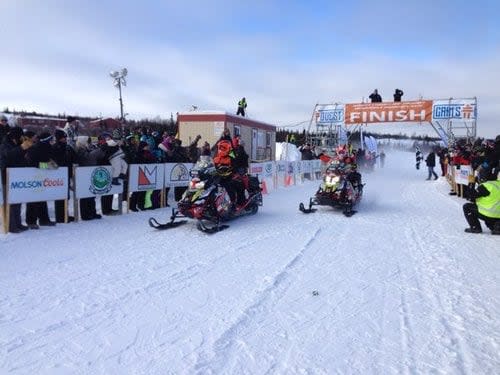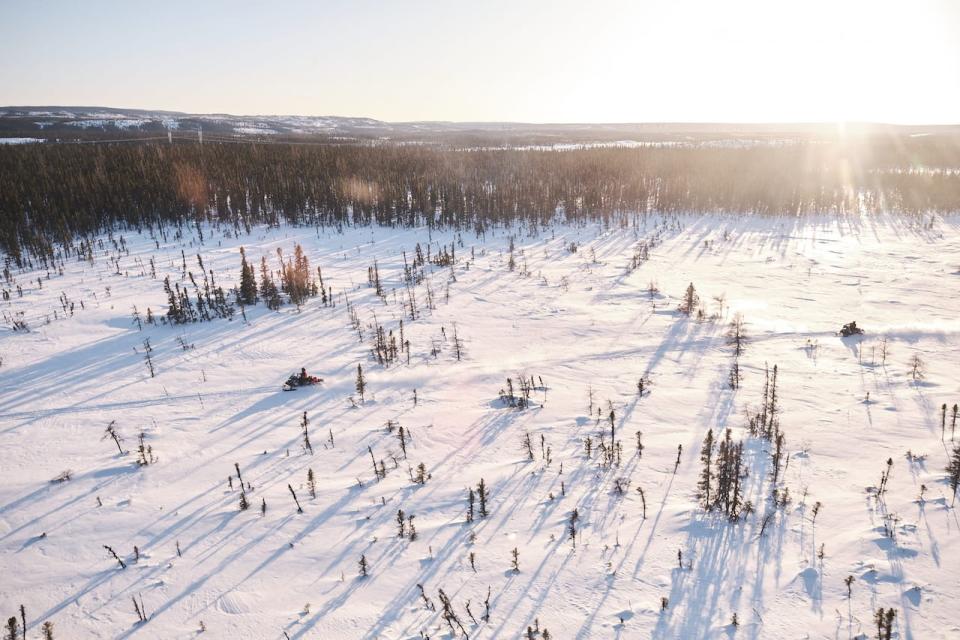Cain's Quest still set for March, but former racers worry warm temperatures pose safety risk

Labrador's flagship ultra-marathon snowmobile race is once again under threat due to unseasonably warm conditions, leaving two veteran racers wondering whether future races should only happen away from the unpredictable coastlines.
Cain's Quest, cancelled last year after a thaw sent one team through ice and left trails sullied by mud and rocks, is slated to begin March 3.
Mushuau Innu First Nation Chief John Nui and his brother Mark Nui made it to Port Hope Simpson in last year's race, but heavy rain and treacherous conditions brought their route to an end.
This year, Mark said, the pair have already been forced to ride their snowmobiles over barren, rocky ground until earlier this month. Snow has been steadily accumulating since then, but some routes commonly used by Cain's Quest racers haven't yet frozen over.
They say racers should stick to traditional hunting and trapping routes if in doubt about the conditions of an area.
"Avoid ice as much as possible," Mark said, pointing out the ice may not be strong enough in some regions if it hasn't yet formed.

Organizers with Cain's Quest say the race is inherently flexible and can be altered if weather conditions deteriorate. (Cain's Quest/Facebook)
In coastal communities,"there's been a lot of changes in weather," John added. "It might be better if Cain's Quest [starts] looking at the future races, to focus on inland, rather than going on ice. Because ice patterns are not very safe."
The Innu chief said he's also worried about ice near Happy Valley-Goose Bay. New racers are at particular risk, he said, and should stick close to those more accustomed to the routes.
"There are parts where there's ice that's ready to go at any time," Mark said.
Cain's Quest organizers remain flexible: chair
Cain's Quest chair Chris Lacey points out the Far North is always an unpredictable place in the winter.
He's committed to let teams know about any cancellation or postponement plans by Feb. 15, he says, but organizers are also ready to alter routes and schedules as the weather requires.
Lacey says the race is inherently flexible — teams have to hit each checkpoint, but how they travel between them is up to them. That means if one route doesn't have sufficient snow or ice cover, there may be another way around.
"There might be inland options that have to be chosen [that] might not be favourable to racers because they're a little bit more complicated or complex, but that doesn't mean it's impassable," he said.
Racers will often assess routes ahead of time to ensure safety, he added, and each machine now has a tracking device monitored around the clock.
"The race is never the same," Lacey said. "One year it could be too cold, and we'd have the risk of hypothermia and things in the woods if someone had to spend the night. The next year it could be too warm."
Download our free CBC News app to sign up for push alerts for CBC Newfoundland and Labrador. Click here to visit our landing page.


